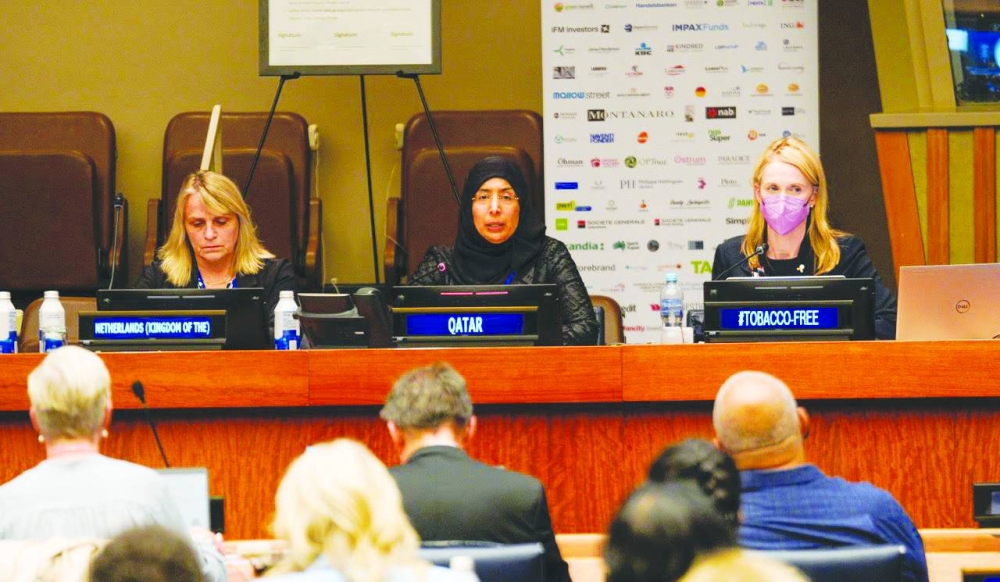Qatar's commitment to build a tobacco-free future was highlighted by HE the Minister of Public Health Dr Hanan Mohammed al-Kuwari at a United Nations event yesterday.
She was addressing a meeting of the fifth anniversary of the Tobacco-Free Financing Pledge on the sidelines of the 2023 UN General Assembly in New York, with the theme " There's no room for tobacco in a Net Zero world'.
The minister reviewed a number of milestones made by Qatar in the field of tobacco control, most notably the significant reduction in tobacco use, as the percentage of youth using any tobacco products dropped from 20% in 2004 to 12.1% in 2018. This aligns perfectly with the national target of a 5% reduction in smoking prevalence by the end of 2022, as stipulated in the second national health strategy to reduce smoking prevalence by 5% by the end of 2022.
Dr al-Kuwari said: "One of the main achievements in this regard is the establishment of a robust legal framework, as Qatar endorsed and implemented the Tobacco Law approved in 2016 in line with the WHO Framework Convention on Tobacco Control. This law prohibits tobacco agriculture and manufacturing within Qatar while allowing only the import of traditional products. It also restricts tobacco-related businesses and trade, imposing a minimum distance requirement of 1,000m from schools. Furthermore, we have banned smoking in closed public places and mandated graphic health warnings on tobacco packages.
"Work has also been done to reduce the demand for tobacco through price increases. Qatar has established a comprehensive tobacco product taxation model, including customs and excise taxes. This resulted in a 100% increase in the price of all tobacco products. Additionally, we implemented tax stamps to enhance indirect tobacco product taxation and support tracking and tracing of tobacco products,"Dr al-Kuwari pointed.
She stressed the country's interest in increasing awareness and behaviour change, for which a national health awareness campaign has been launched targeting at-risk groups such as youth and workers.
"We have also been keen to provide standardised, quality, integrated and accessible tobacco cessation services, as tobacco cessation centres have been established in the public and private sectors, with 13 out of 31 primary healthcare centres in Qatar currently providing these services. In addition, HMC's Tobacco Control Centre treats approximately 1,200 new patients each year, trains clinicians and specialists to ensure the best quality of care, promotes health awareness, conducts scientific evidence-based research, and utilises innovative services such as laser therapy to help people stop smoking,” noted the minister.
The minister highlighted that the selection of HMC Tobacco Control Centre as WHO Collaborating Centre, further confirms Qatar's commitment to global tobacco control efforts.
"School-based surveys were also conducted in 2004, 2007, 2013 and 2018, as well as adult surveys in 2007, 2013 and 2023. Furthermore, in the current year, we have established a Tobacco Products Quality Control Laboratory to ensure that the specifications and safety of tobacco products meet the designated standards," she continued.
Dr al-Kuwari also spoke about the tobacco control policies implemented during the FIFA World Cup Qatar 2022, where Qatar played a pivotal role in ensuring that the tournament was 100% tobacco-free. This included raising awareness about tobacco hazards, enforcing tobacco-free policies through trained volunteers and security personnel, and overseeing policy implementation while providing a report for future events.

HE Minister of Public Health Dr Hanan Mohammed al-Kuwari along with other officials at the UN event.
